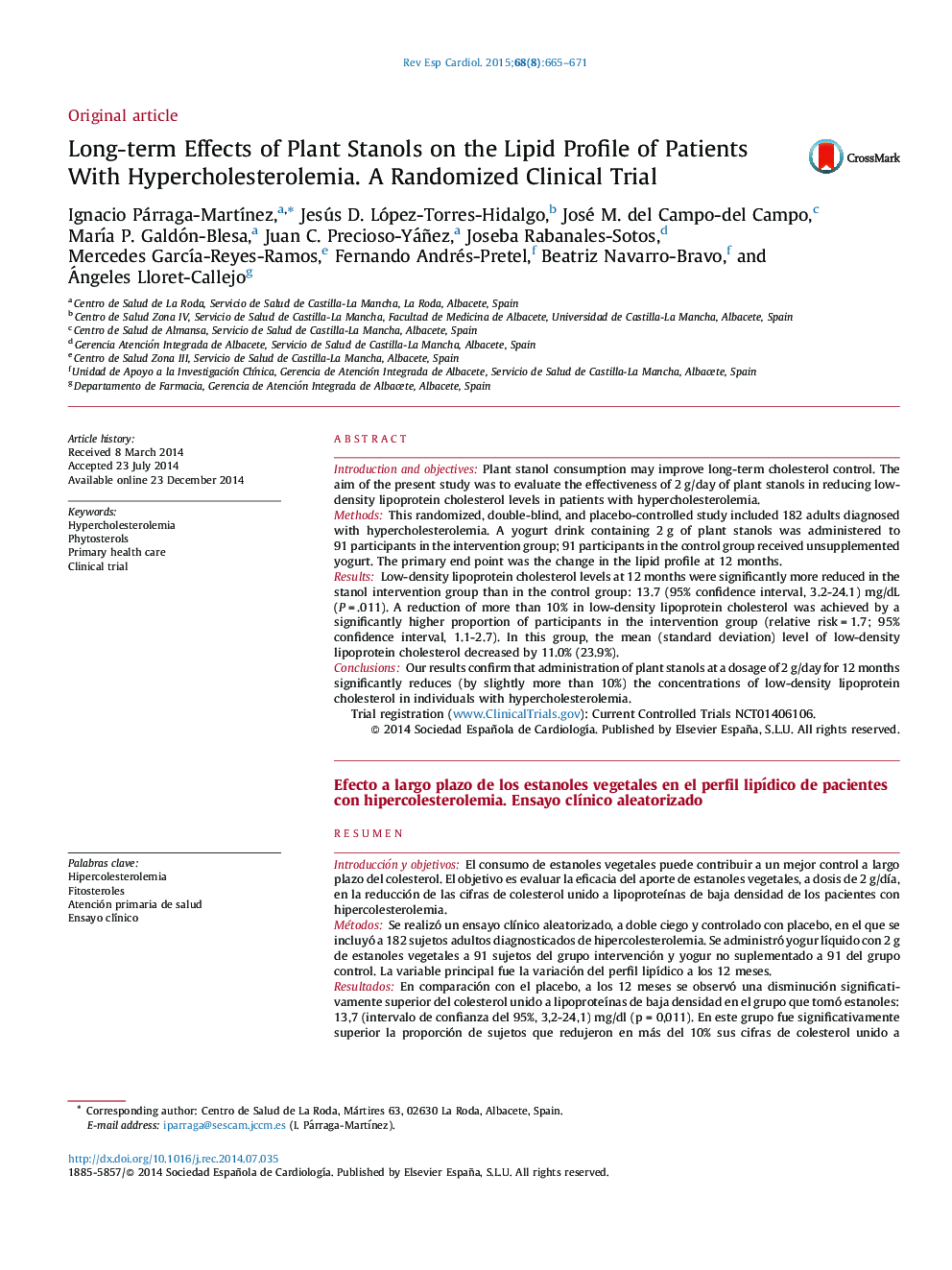| کد مقاله | کد نشریه | سال انتشار | مقاله انگلیسی | نسخه تمام متن |
|---|---|---|---|---|
| 3016823 | 1182097 | 2015 | 7 صفحه PDF | دانلود رایگان |
Introduction and objectivesPlant stanol consumption may improve long-term cholesterol control. The aim of the present study was to evaluate the effectiveness of 2 g/day of plant stanols in reducing low-density lipoprotein cholesterol levels in patients with hypercholesterolemia.MethodsThis randomized, double-blind, and placebo-controlled study included 182 adults diagnosed with hypercholesterolemia. A yogurt drink containing 2 g of plant stanols was administered to 91 participants in the intervention group; 91 participants in the control group received unsupplemented yogurt. The primary end point was the change in the lipid profile at 12 months.ResultsLow-density lipoprotein cholesterol levels at 12 months were significantly more reduced in the stanol intervention group than in the control group: 13.7 (95% confidence interval, 3.2-24.1) mg/dL (P = .011). A reduction of more than 10% in low-density lipoprotein cholesterol was achieved by a significantly higher proportion of participants in the intervention group (relative risk = 1.7; 95% confidence interval, 1.1-2.7). In this group, the mean (standard deviation) level of low-density lipoprotein cholesterol decreased by 11.0% (23.9%).ConclusionsOur results confirm that administration of plant stanols at a dosage of 2 g/day for 12 months significantly reduces (by slightly more than 10%) the concentrations of low-density lipoprotein cholesterol in individuals with hypercholesterolemia.Trial registration (www.ClinicalTrials.gov): Current Controlled Trials NCT01406106.
ResumenIntroducción y objetivosEl consumo de estanoles vegetales puede contribuir a un mejor control a largo plazo del colesterol. El objetivo es evaluar la eficacia del aporte de estanoles vegetales, a dosis de 2 g/día, en la reducción de las cifras de colesterol unido a lipoproteínas de baja densidad de los pacientes con hipercolesterolemia.MétodosSe realizó un ensayo clínico aleatorizado, a doble ciego y controlado con placebo, en el que se incluyó a 182 sujetos adultos diagnosticados de hipercolesterolemia. Se administró yogur líquido con 2 g de estanoles vegetales a 91 sujetos del grupo intervención y yogur no suplementado a 91 del grupo control. La variable principal fue la variación del perfil lipídico a los 12 meses.ResultadosEn comparación con el placebo, a los 12 meses se observó una disminución significativamente superior del colesterol unido a lipoproteínas de baja densidad en el grupo que tomó estanoles: 13,7 (intervalo de confianza del 95%, 3,2-24,1) mg/dl (p = 0,011). En este grupo fue significativamente superior la proporción de sujetos que redujeron en más del 10% sus cifras de colesterol unido a lipoproteínas de baja densidad (riesgo relativo = 1,7; intervalo confianza del 95%, 1,1-2,7). En el grupo tratado, el colesterol unido a lipoproteínas de baja densidad descendió, en promedio, un 11,0 ± 23,9%.ConclusionesLos resultados confirman que la administración de estanoles vegetales en dosis de 2 g/día durante 1 año produce una reducción significativa (ligeramente superior al 10%) de las concentraciones de colesterol unido a lipoproteínas de baja densidad en sujetos con hipercolesterolemia.Registro del ensayo (www.ClinicalTrials.gov): Current Controlled Trials NCT01406106.
Journal: Revista Española de Cardiología (English Edition) - Volume 68, Issue 8, August 2015, Pages 665–671
